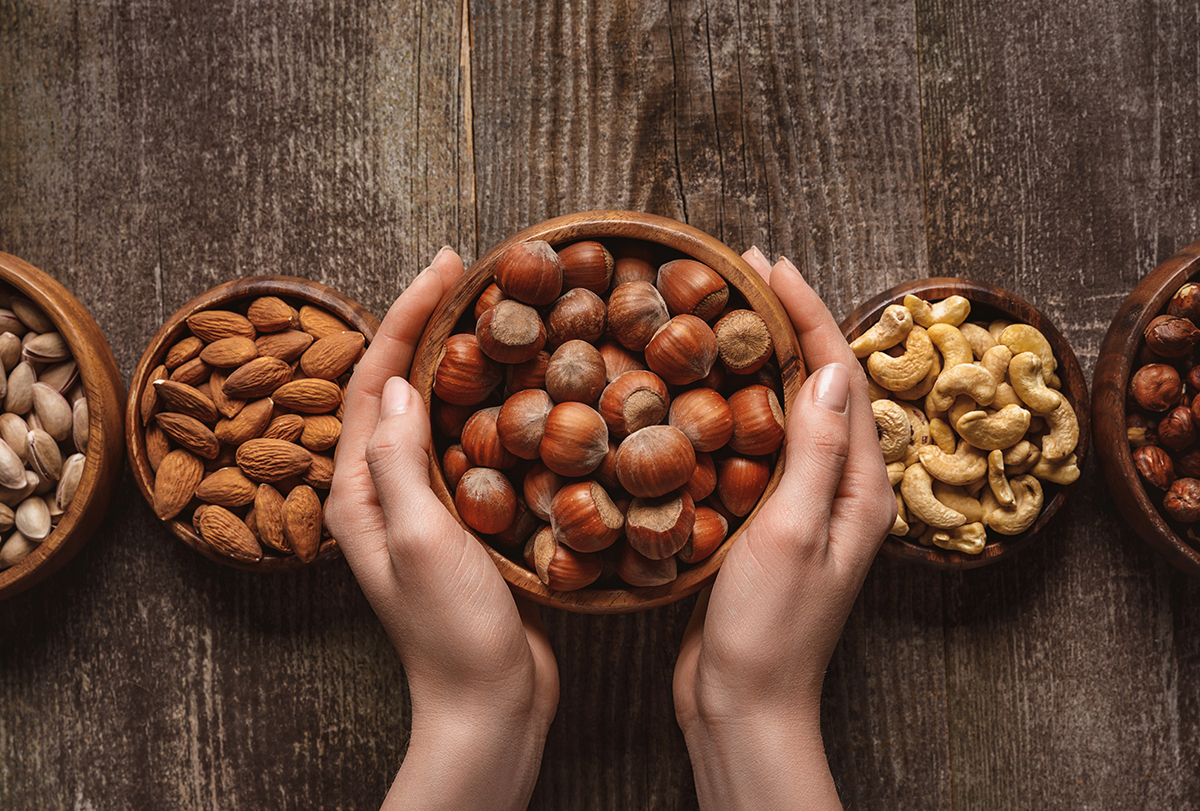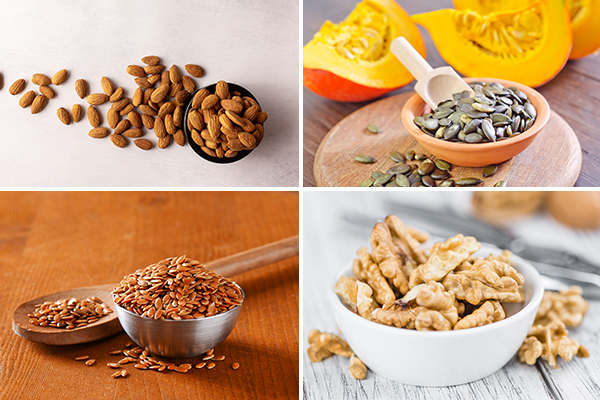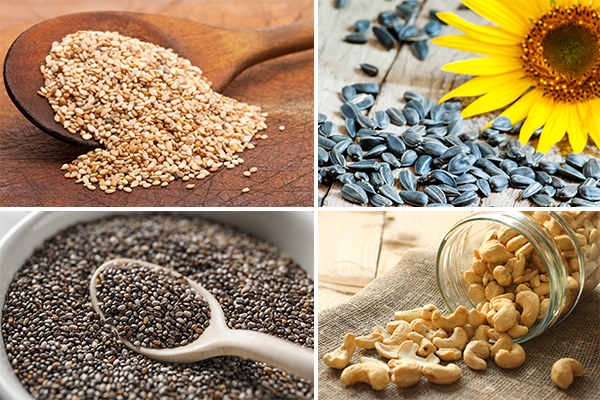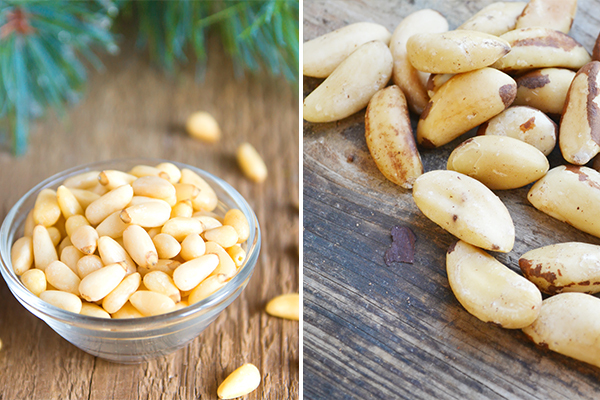In this article:
Most tree nuts and seeds are loaded with fiber, beneficial fatty acids, vitamins B and E, protein, and many nutrients and can be an excellent addition to your daily diet.

They are packed with nutrients and antioxidants, and the monosaturated fatty acids in them are great for your heart.
However, like all other things, they should only be eaten in moderation as they contain excessive calories and fats. (1)(2)
Healthy Nuts and Seeds You Should Eat Daily
Here are the most beneficial nuts and seeds you can add to your diet every day
1. Almonds
Almonds are the seeds of the almond tree. They are rich in protein, fiber, antioxidants, magnesium, manganese, vitamin E, and monosaturated fatty acids.
Almonds also contain an amino acid called arginine, which can help improve blood flow and relax the blood vessels. (3)
The magnesium content of almonds may help indirectly lower blood pressure. Thus, these nutritious nuts can help fight hypertension and heart diseases and can also be beneficial for people suffering from erectile dysfunction. (4)(5)(6)
Recently, almond flour has been proposed as an alternative to wheat flour for people on a keto diet or who are suffering from gluten intolerance.
2. Flaxseeds
Flaxseeds are another highly nutritious food source. They contain high amounts of omega-3 fatty acids (nearly 6,000 mg per ounce!) and can be great for your heart health. The high fiber content in these seeds can also improve your digestion. (7)
Flaxseeds are also the richest plant source of lignans – phytoestrogens that can help ease the symptoms of PMS and other menstrual problems in women. (8)
3. Pumpkin seeds
Pumpkin seeds are tiny, semihard seeds of the Cucurbitaceae or pumpkin family. They are filled with minerals including zinc, magnesium, and iron, as well as healthy fatty acids and protein.
According to multiple sources, 1 tablespoon of pumpkin seeds contains as much as 40 mg of zinc.
Pumpkin seeds also have antioxidant and anti-inflammatory properties due to their vitamin K, vitamin E, and folate content. They have also been proven to be good for your heart due to their healthy fatty acids. (9)

4. Walnuts
Walnuts are rich in melatonin and vitamin E along with other phytochemicals, giving these slightly bitter nuts the highest antioxidant value of all nuts. (10)
Walnuts also contain large amounts of protein and healthy fats that help keep your cholesterol levels in check. (11)
According to several studies, consuming walnuts regularly helps control your blood pressure, lower “bad” cholesterol levels, and improve blood circulation to the brain. (12)
5. Sesame seeds
Sesame seeds are anti-inflammatory and can be very beneficial for people suffering from osteoarthritis and other inflammatory health conditions. (13) They, like all other nuts and seeds, are also filled with minerals, vitamins, and phytosterols.
Sesamin, an important compound present in sesame seeds, helps lower blood pressure in people with hypertension. (14)
6. Chia seeds
Chia seeds have been used for centuries in North America as a source of protein. (15) They contain all the essential amino acids.
Chia seeds are also rich in antioxidants, alpha linoleic (ALA) fatty acids, omega-3 fatty acids, and fiber, among others. Some studies have shown that chia seeds can reduce up to 70% of free radical activity. (16)
7. Sunflower seeds
Sunflower seeds are edible but are mainly used to produce sunflower seed oil. They are an excellent source of vitamin E, which acts as an antioxidant and helps protect your body from free radical damage. (17)

8. Cashew nuts
Cashews are one of the most widely eaten nuts in the world. They are replete with iron, vitamin K, magnesium, and fiber.
Cashew nuts can help increase hemoglobin content in pregnant women and reduce high cholesterol levels. They serve as a good source of protein as well. (18)
Note: People with cancer should avoid eating cashews.
9. Brazil nuts
Brazil nuts are abundant in copper, zinc, selenium, vitamins, and manganese. They have several antioxidant and anti-inflammatory properties that can help fight inflammatory conditions.
Brazil nuts are good for your heart health and can be beneficial in reducing blood sugar levels in people with diabetes. (19)
10. Pine nuts
Pine nuts are rich in a number of vitamins and minerals including vitamin C, vitamin B6, iron, and magnesium. They can help strengthen your skeletal and immune systems and improve your eyesight and skin texture, among other benefits. (20)

Precautions to Consider
- Do not store nuts for more than a year as they can start accumulating bacteria or other microorganisms.
- Make sure you do not have any nut allergies before consuming nuts.
- Do not overeat nuts as they are also very high in calories and fats.
What Is the Right Amount of Nut Consumption Per Day?
The US Food and Drug Administration recommends a serving of a handful of nuts per day.
Final Word
Nuts and seeds have been used since ancient times as a superfood. They are an excellent source of many nutrients and should be made a part of your everyday diet.
Vegans can particularly benefit from the jam-packed minerals and protein present in these tiny foods.
- Was this article helpful?
- YES, THANKS!NOT REALLY


